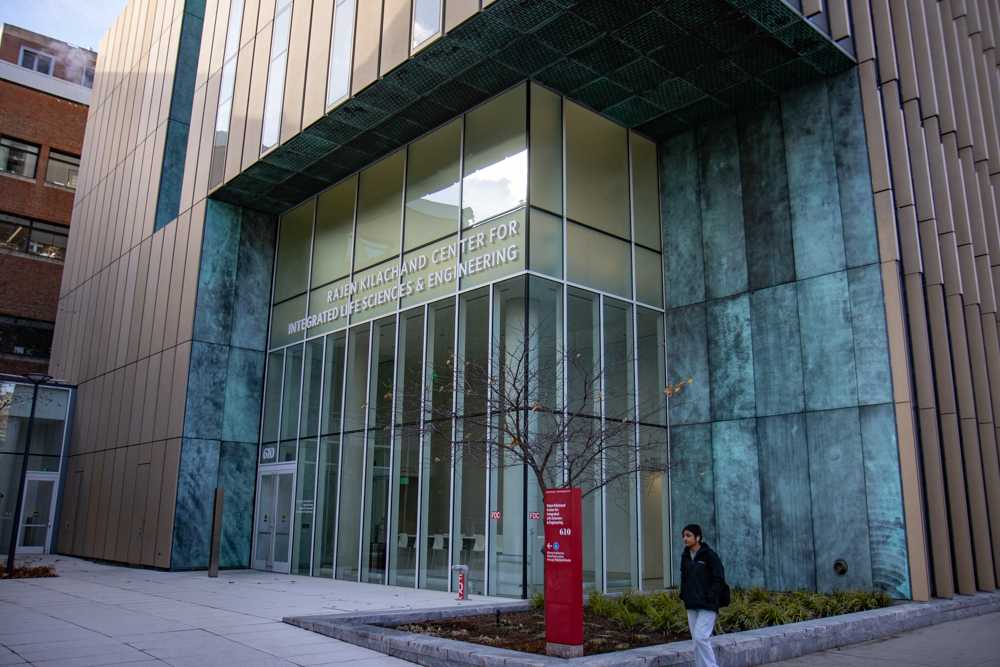During midterms, college students hardly have enough time to think, let alone think about the environment. But global warming will affect students long after their exams are over. And, unlike studying for midterms, combating global warming doesn’t have to be stressful, experts say.’
Because Boston University students live in dorms, where they have very limited control over how much and what sort of electricity is being used, trying to eradicate energy problems can seem difficult.
However, there are many small things students can do to reduce their carbon footprints, Emily Diamond-Falk, the climate communications manager for the Environmental Defense Action Fund, said.
‘It’s good if when college students are doing their laundry, they make trips with full loads as opposed to half loads,’ Diamond-Falk said. ‘And a great tip for college students is to make sure their computer monitors are not on when they’re not using it for at least 20 minutes.’
Students who live off campus can lessen their carbon footprint by being more active about the decisions they make in their own households, Diamond-Falk said. By choosing fluorescent light bulbs over standard light bulbs, students reduce the amount of energy being used and save money over time because fluorescent light bulbs last more than 10 times longer than normal bulbs.
‘One of the ways to make sure you’re reducing carbon emissions in winter months is to insulate your houses really well to keep down heating bills,’ Diamond-Falk said. ‘If your house is powered by coal, it’s obviously helpful to use as little coal as possible.’
Something every student can do, no matter where they live, is change their diets, Aaron Huerta, the press secretary for The Union of Concerned Scientists, said.
‘One thing people tend not to think about is that the type of food they eat takes different amounts of energy to create a calorie,’ Huerta said. ‘Reducing the amount of meat, especially beef, is the third most important way to reduce environmental impact.’
Just knowing where your resources come from can also make a difference, Meghan Krause, an associate for GreenMark ‘-‘- a company that advocates global warming education ‘-‘- said.
‘When you’re purchasing power, it’s important to know what you’re buying and where it’s coming from,’ Krause said. ‘Does it make sense to buy local? Does it make sense to buy organic? College students have a natural curiosity when making decisions and exploring mundane and minute tasks, such as where your milk comes from, can make a big difference.’
Krause also said that while selecting the right products can make a difference, so too can selecting the right candidate. Researching politicians in local and national elections can impact how energy will be consumed by the country, she said.
‘Now is an important time ‘-‘- like no other ‘-‘- to be ushering in a new administration and to make the environment an apparent consideration when voting,’ Krause said. ‘Knowing where environmental records align with or don’t align with records of particular candidates is important.’
In addition to saving energy, being carbon friendly can also save people money, Nalin Kulatilaka, a professor in the School of Management, said.
‘Most of the power in California is generated in Nevada, and power lines lose in these things,’ Kulatilaka said. ‘If you’re generating over a rooftop with solar panels, you don’t have any transportation costs.’
At a time when people are wary of new and costly technology, people should remember that green technology is cheaper in the long run, Huerte said.
‘Renewable electricity standards do two things,’ he said. ‘One is that they diversify energy supplies, and people save money on utility bills for renewable electricity. In addition to burning coal, they also burn natural gas, so when increasing energy supply, like with wind, they reduce during peak times and help save money on utility bills.
‘The other thing is that solar panels create more jobs than coal fire power plants. And they’re well-paying jobs that can’t be exported to other countries. They’re green-collared jobs.’
Huerte said he thinks everyone should want to help the environment because it connects all of us.
‘People tend to think of the environment as something out there and outside of us,’ Huerte said. ‘We all breathe the same air, live on the same land and play, work and worship here. It’s part of us, and we’re part of it.’
The consequences of ignoring the issues are far worse than taking minimal action,’ he said.
‘Global warming is here already,’ Huerte said. ‘The carbon emissions our great grandparents left from their model T cars ‘-‘- they didn’t know any better, but now we have the benefit of knowledge and along with benefit comes responsibility.
‘We know that temperatures are going to rise regardless of what we’re going to do. We decide what future we give to our children and grandchildren. Our future depends on ourselves and depends on how much carbon we put in atmosphere.’
Huerte said college students, in particular, should care about the environment because its future will define their generation.
‘I think it’s going to be the thing that this generation is going to get judged on.’
Categories:
Reducing your carbon footprint doesn’t have to take too many steps
By Daily Free Press Admin
•
October 7, 2008
0
Donate to The Daily Free Press
Your donation will support the student journalists of Boston University. Your contribution will allow us to purchase equipment and cover our annual website hosting costs.
More to Discover




















































































































